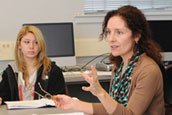Bruce Wightman: Great Teachers, Great Courses

What insights can worms provide about tissue and organ systems in the human body?
What insights can worms provide about tissue and organ systems in the human body? Dr. Bruce Wightman, associate professor of biology at Muhlenberg, is using his $375,000 National Science Foundation grant to fund research to find out.
Wightman’s laboratory focuses on understanding the molecular pathways – the series of specific steps--that allow cells to communicate with each other to create organized tissues and organs during animal development.
Nematode worms, the subject of Wightman’s research, have a gene that functions in the development of several organs, including the uterus. Wightman’s lab looks at how the NHR-67 protein formed by this gene controls and is controlled by other genes.
The NHR-67 gene is also present in vertebrates, including humans, where it functions in the development of neural stem cells. Wightman anticipates his research will advance understanding tissue and organ growth in other animals.
The National Science Foundation grant allows Wightman to fund a full-time lab manager, student stipends for summer research, supplies, equipment, travel costs and the day-to-day operations of the lab.
“We’re looking at how different cells divide and how they specialize,” says Wightman. “This research could give us some insight on how complex tissues and organ systems communicate with each other during development.”
“My work in the lab has solidified my understanding of the molecular biology that has been taught to me in other classes. I have also sharpened my writing, critical thinking and analytical skills, which will be extremely important in my life as a future physician."”
-Tiffany Zehner ’10, Biology major, Music minor
Would you like to learn more about our Great Teachers and Great Courses? Take a look at our other stories to see the many aspects of our unique, boundary-breaking community.















